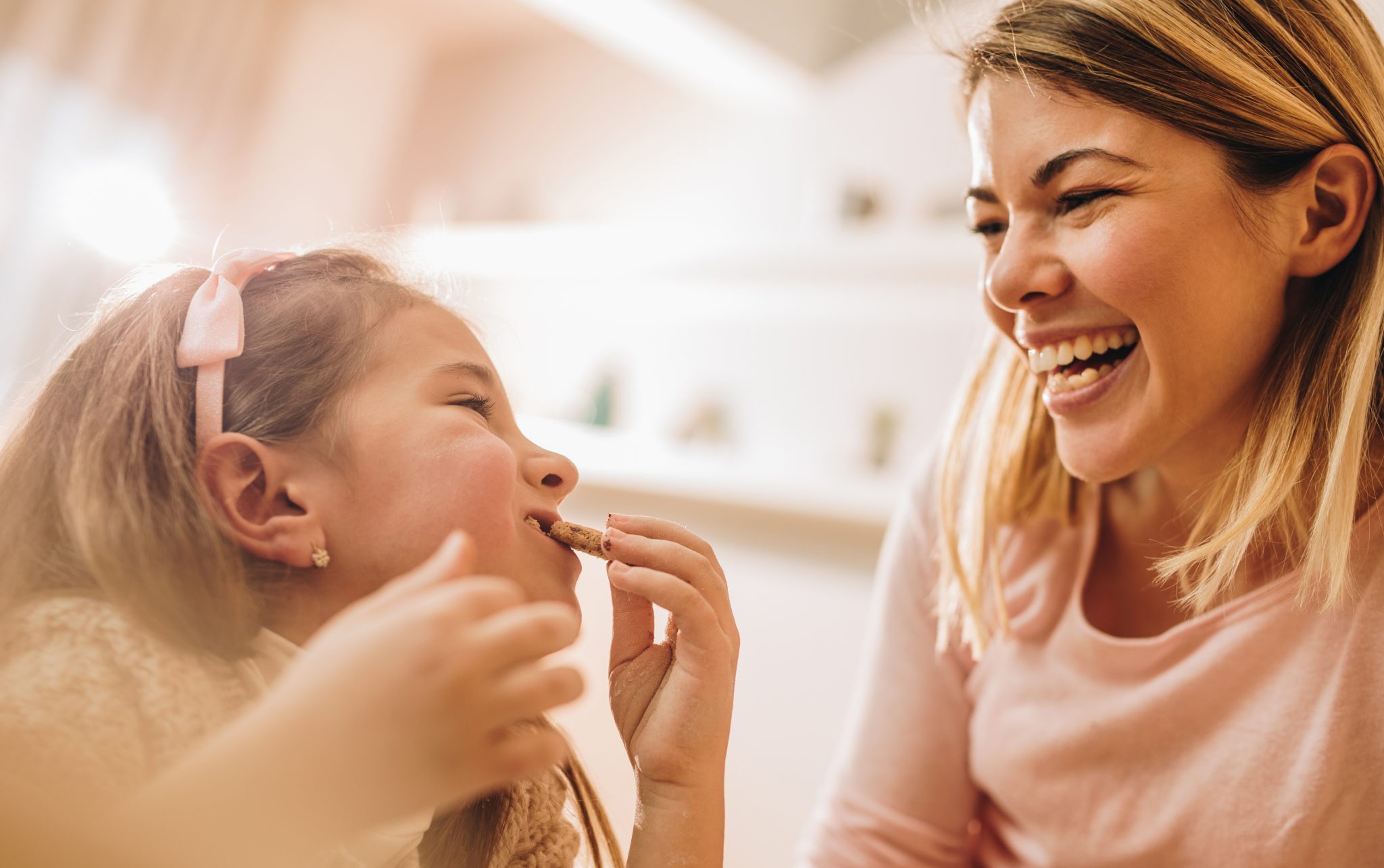We all know that too much sugar is bad for us, and yet, every time we go to the store, we are bombarded with shelves packed with sweets and sugary treats that tempt us against our better judgment. While we might have the will to say ‘no’ to the allurement, knowing the dangers, kids, on the other hand, just see all the tasty snacks and none of the downsides. As responsible adults, it’s our role to take the situation in hand and limit the negative sugar effects on our children’s health. But how to do that in a society filled with delicious sweet treats?
Your body on sugar
Sugar forms fuel for your system, when you intake sugars or carbohydrates, this is broken down and used to create that much-needed energy that keeps you moving.
For children aged between 2 and 11 years old, the recommendations say that no more than 6 teaspoons a day or 33 grams are needed of the white stuff. And yes, we know it’s tricky to measure this out, especially when everything we eat seems to contain just a little extra.
But what does this tasty substance do to your body and is it really bad? Yes, and no. As we said sugar is used to power your system and keep it going, the thing is, there are two different general types of sugar – free/added sugars and naturally occurring ones – and having too much of the first is when problems start.
So, let’s take a look at what’s going on behind the scenes.
- The brain – sugar is tasty, but it can also be addictive. When we ingest sweets and other nice things, our brain releases a feel-good hormone that makes us want more and more often.
- Pearly whites – we all know how important brushing is in keeping those cavities at bay, but this is especially important after eating sugary foods. Sugar molecules combine with mouth bacteria and your saliva and form plaque on your teeth. This dissolves the enamel (tooth protection) and forms cavities.
- Digestive system – a treat now and again is fine but eating way too much sugar puts you at an increased risk of heart disease, diabetes, and other health conditions. This is because when you overeat sugar, more than you need for your energy levels, your pancreas is activated and tells your body to convert that glucose (blood sugar) to glycogen, which is stored within your body leading to weight gain.
Not all sugars are bad
Luckily, or unluckily for us, not all sugars are created equal, and while it might be tricky to tell the good from the bad, this is our helpful guide to help you out.
First, there are the ‘free sugars,’ these are the ones you need to look out for. They are the monosaccharides (one sugar molecule) and disaccharides (two sugar molecules) that are added to foods; meaning they do not occur naturally. However, this group also includes honey, fruit juices, and syrups, so be careful.
The World Health Organization (WHO) recommends these should make up less than 10% of your daily calorie intake, and ideally less than 5%. Sometimes these are labeled on packages as ‘added sugars.’
Next, there are those naturally occurring sugars, these are the ones you find in whole fruits and vegetables, aka the healthy sugars.
Does sugar affect child behavior?
Sugar crazed monster? Well, according to research – that’s a myth (mostly). Meta-analysis showed that sugar doesn’t seem to have any effect on the behavior or cognitive abilities of kids. Meaning that sugar high you’ve been seeing, might not be a sugar high at all.
The studies also showed that parents who thought their kids consumed sugar were more likely to label them as out of control or over-excited, even when they were given a placebo.
That said, this doesn’t cover every child in every case, and admits, that in some children, sugar may have a negative effect on their behavior. However, on the whole, in general, this is all a matter of perception.
But just because your child doesn’t get hyperactive after a few bites of a treat doesn’t mean you don’t need to watch their intake. Instilling a healthy diet in the early years sets your little one up for a lifetime of better eating. After all, those other nutrients are important too.
Top tips for reducing kids’ sugar intake
1. More H2O!
Feeling thirsty, don’t immediately hand out that sweet fruity drink. Juices will count towards that five-a-day, but in their juiced form they’re also pretty packed with sugars and less of the fiber that slows their absorption. Instead reach for good old-fashioned water with a piece of fruit that will leave your kid hydrated and healthy.
2. Snack with care
It’s tempting to grab whatever is nearest when you’ve heard “Mom, I’m hungry,” or “Dad, I want a snack” 50 times already today, but sugary treats are not the answer. Instead of that piece of chocolate make sure you keep stocked with healthy, low maintenance snacks, such as those suggested by our contributing dietician in this post – ants on a log, frozen grapes, or fruit kebabs, anyone?
3. Role model good behavior
Think your kid doesn’t know what’s in that sneaky top cupboard, of course, the do, unless you’re excellent at hiding when you nibble. But, be aware, children are really good at picking up on your habits, even when you don’t want them to.
This is why, it’s vital that you role model a healthy relationship with food, even the ‘junk’ food. If you’re hiding your snacking habits, children are more likely to believe that this is something naughty that should be hidden and develop an unhealthy relationship with food.
However, if you model healthy behavior, it’s more likely your little one will grow up with the same beliefs.
4. Add some healthier desserts
A little sweetness is good sometimes, and as part of modeling healthy behavior, it might be time to boost your culinary skills and get to grips with some healthier versions of desserts.
Try baked apple, cinnamon and honey instead of that classic apple pie, or some banana-based ice ‘cream’ or even a baked berry mix. This is also a perfect opportunity to spend some quality time and teach those all important in-kitchen skills.
5. Don’t just say food is bad, talk to them about it
Although we’d sometimes like to, we, as parents or caregivers, don’t have full control over our children’s diet. They will go out and experience the world on their own, making their own choices along the way.
This is why it’s vital when it comes to diet that you talk to them about the ‘whys’ or why things are healthy or unhealthy, and how much. Even those ‘bad’ foods can be taken in moderation and keeping them forbidden isn’t always the key to dietary success.
My tale with the white stuff
Now that you know a little more about the why and the how and have made the decision to seek a lower-sugar diet; it’s time to look at one other parenting challenge…getting everyone else on board.
When my daughter was born, I swore there would be no unhealthy snacks, well, at least for the first couple of years. When she started on solid food, I spent those evening preparing those healthy broccoli pots, carrot mashes, and potatoes, and other veggie mixtures, ready for the next day. And it worked, there was no, “yuck!”, “foo”, or anything similar. She ate everything with happiness. But then it came time to visit the relatives…
At six months old, sitting in the kitchen talking with some of the clan, she was offered some chocolate. And like most parents I found myself on that tricky ground between not giving my little one the sugary treat when she had barely started on solids and offending the family.
We tried to say, “no, it’s ok,” but they were having none of it and kept insisting that the child needed the chocolate. So, I did the only thing I could think of – I lied! (sorry) I said she had a milk allergy.
Was it untrue? Yes. Would I do it again? Maybe, but only in the interests of preserving the peace. Generally, I’m all for the whole truth and nothing but the truth.
However, this is but one example of the challenge’s parents can face when trying to instill healthy eating habits and monitoring their kids’ sugar intake. Probably you’ve been in the position where you’ve found it hard to decline a kind, yet very insistent offer from some relatives.
3 ways to ask people (politely) not to give sugar to your child
1. Decline smoothly and firmly
First and foremost, try the polite, yet firm, direct approach. Hopefully that “no, thank you” will be understood, even if you have to say it twice. But, if that doesn’t do the trick, move on to step 2.
2. Try being honest
I know, a little hypocritical on this one, but it is worth trying. After all, honesty is the best policy. Sometimes explaining to the family or another person that your child doesn’t eat sugar is just what’s needed. Try answering their “whys” and “sure, we gave you sugar, and you turned out fine” with your knowledge (see above).
Unfortunately, some of our nearest and dearest can be pushy, so if push comes to shove to keep things friendly, it might be time to break out a little white lie or two. But, be warned, if your kids can talk already, they might give you away.
3. Show appreciation
Manner matter, so make sure to add that “thank you” into the mix, no matter whether you chose to go with the truth or not. That firm, “no, but thank you” might be enough to leave your relatives satisfied with their attempt without pushing it further.





